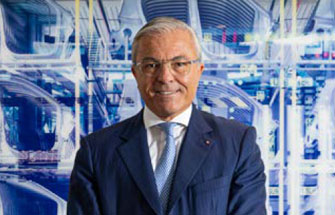Last June, the AMAF and the Prince’s Government hosted a conference on the theme “Leveraging digital technology for banking”. During the event, we spoke to Mr Francesco Grosoli, CEO of CMB Monaco, about how WealthTech fits in with Private Banking.
What sort of impact is technology having on the private banking sector?
The technological revolution has radically transformed the entire banking sector, and particularly private banking, a traditional field that had been playing catch-up in terms of innovation, always putting human contact between banker and client first. Now, digitisation is opening up new opportunities for our profession in terms of interaction with clients, who are increasingly young and very familiar with the use of technology.
The rise of digital tech has also impacted the way we work internally thanks to the cloud, which enables us to store and manage massive quantities of data, making them easily accessible no matter where they happen to be. Most cloud services providers are also adopting more advanced security measures than those individual firms would be capable of. The ability to share data and documents securely and in real-time via the cloud encourages informed investment decisions, and makes it easier for private banks to personalise the services they offer.
What specific technological solutions do you think hold the most promise for the future?
Fintechs are adding more and more technological tools to our kit, opening up the way for increasingly accurate and efficient services. When combined with better internal execution, those tools enable us to provide clients with more granular, more sophisticated services.
With RPA (Robotic Process Automation), private banks can mechanise repetitive tasks and free up valuable time for other high-added value work. Automation also naturally reduces the scope for human error and cuts operational risks.
Artificial intelligence (AI) too is having an impact on private banking, with improvements in areas such as customer experience, risk management, regulatory compliance, and security. AI can be used to analyse client data and provide personalised investment recommendations. However, it’s important to emphasise that, while AI can be a very useful source of information and advice, it always needs to be backed up by human expertise, and there must be a human in the loop at all times.
How are private banks like CMB Monaco taking on the challenge of attracting and holding onto NextGen clients?
What we are seeing right now is a dual revolution: technological and generational. Past and future clients are increasingly demanding when it comes to the use of technology and the way they interact with their bank. We have moved from the fax generation to the WhatsApp generation, and will continue to evolve in the years to come. So it’s vital for us to secure the loyalty of future generations while attracting entrepreneurs who keep up with technological progress.
The emergence of mobile apps and online platforms is making it easier for clients to access their accounts and manage their investments. Going big on sustainability is crucial: NextGen clients are often more sensitive to ESG (Environmental, Social, and Governance) issues than previous generations. If we want to attract and keep clients, we need to offer sustainable investment options and promote ESG principles.
WealthTechs have revolutionised the private banking sector by offering low fees and capitalising on technology to offer clients a more approachable, user-friendly experience. They focus on personalised investment solutions, guaranteeing greater transparency and introducing new ranges of investment products and strategies. The challenge for institutions like CMB Monaco is to attract and hold onto NextGen clients while providing a personalised experience and top class service.
With technology driving rapid change, what are the main challenges facing private banks in the years ahead?
In this fast-changing environment, it’s essential not to miss the boat when it comes to the current technological transition. That means developing the ability to get ahead of the curve and anticipate what our clients will need in the next 20 years. We also need to be constantly on the lookout for external stakeholders, who could potentially enter the market offering a brand new customer experience.
Traditional private banks rely on their heritage, proven systems and processes, but they could find themselves facing big challenges in the next few years. Big tech companies could emerge as potential competitors, perhaps even the giants of the luxury sector too, as they target a similar type of client to ours.
We need to be proactive in preparing for these challenges, by investing in R&D, strengthening cybersecurity, adopting agile ways of working, and keeping our finger on the pulse of the latest technological advances and our clients’ evolving needs. That’s the way to ensure we stay relevant and competitive in a constantly changing environment.






